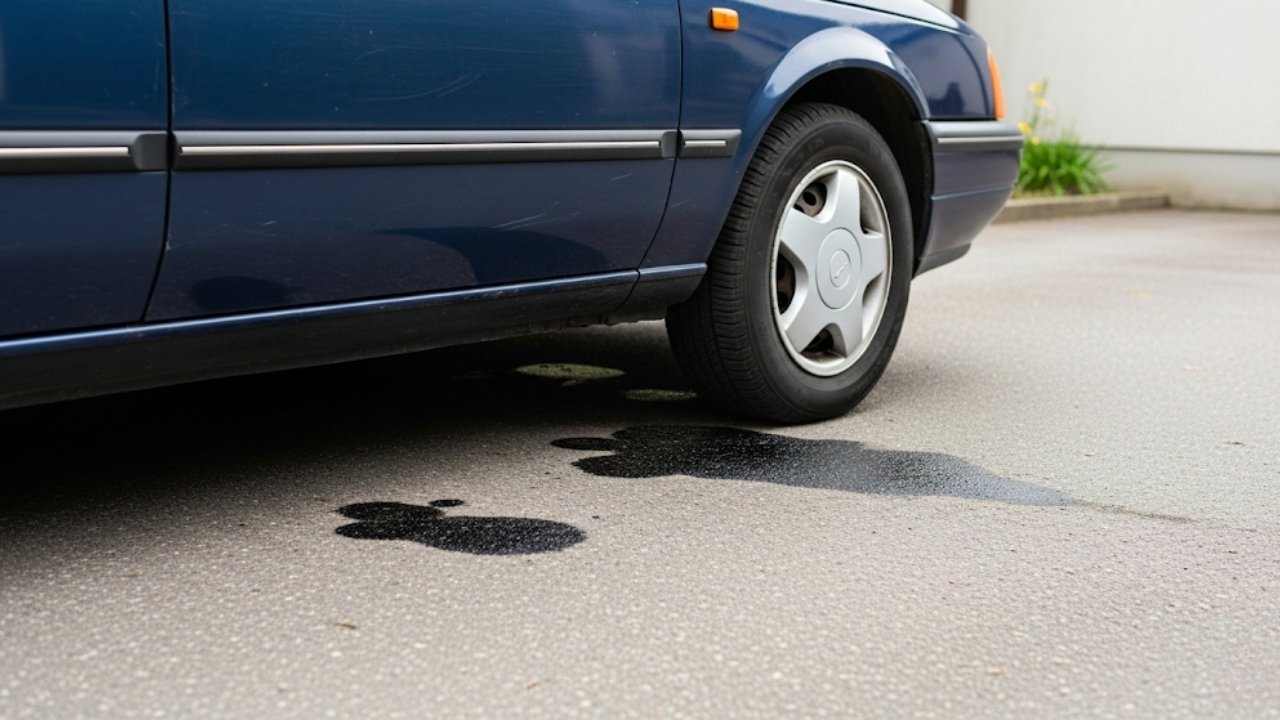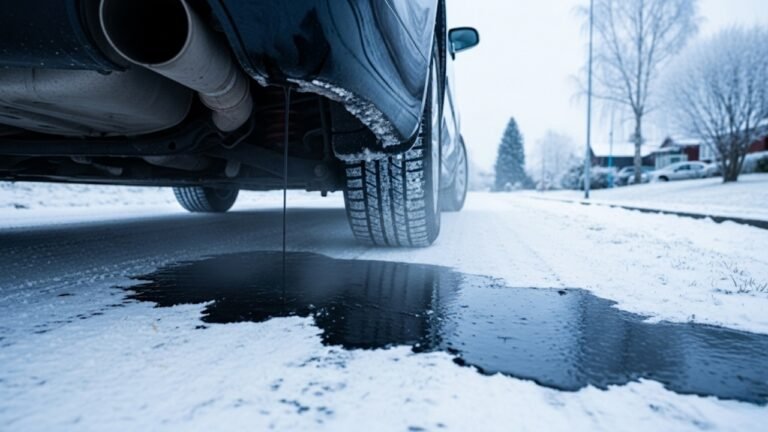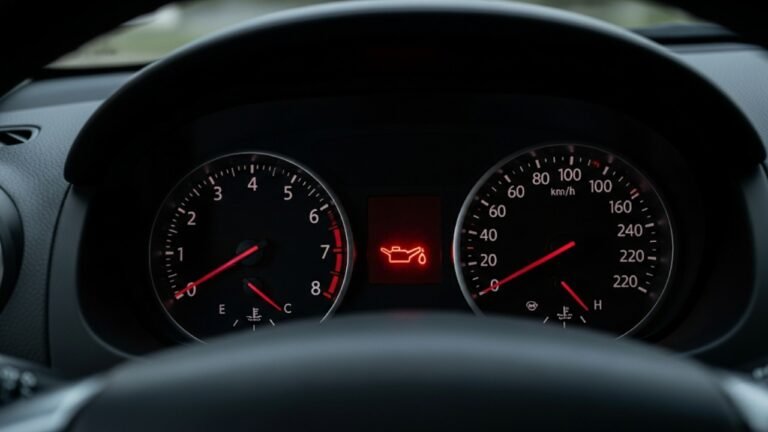Why Your Car Is Leaving Oil Spots on the Driveway: A Friendly Guide

Have you ever stepped out in the morning, ready to take on the day, only to find a black puddle under your car? It’s like your car left a sad, greasy tear on your driveway. If this has happened, you’re not alone—and your car might be telling you something important. That oil leak from car could mean a minor issue or signal a major one lurking underneath the hood.
I remember the first time it happened to me. I shrugged it off, thinking it was just some old residue. A week later, my engine sounded like a growling bear on a caffeine rush. Lesson learned.
In this article, I’ll walk you through everything you need to know about oil leaks, from causes to consequences, how to spot them early, and what you should do next. We’ll keep it simple, practical, and a bit personal—because car troubles aren’t just mechanical; they’re emotional too.
The Hidden Danger Beneath Your Car: What an Oil Leak Means

Your car relies on engine oil for:
-
Lubrication (less friction = less wear)
-
Temperature control (keeping parts cool)
-
Cleaning (removing sludge and grime)
-
Sealing (blocking tiny gaps inside engine parts)
When there’s not enough oil, metal grinds on metal. That’s a fast track to disaster—and trust me, engine repairs aren’t cheap. I had a friend pay over $2,000 just because he ignored a leak for too long. Not worth it.
Spotting the Signs: Is That Really an Oil Leak?
Before panic sets in, let’s confirm if you’re really dealing with an oil leak from car. Sometimes, fluids get mixed up. Here’s how to tell:
| Fluid | Color | Texture | Smell | Location |
|---|---|---|---|---|
| Engine Oil | Amber to dark brown | Slick and thick | Burnt, chemical | Under engine or front area |
| Transmission Fluid | Bright red or pink | Slippery | Sweet or burnt | Center/mid vehicle |
| Coolant | Green, orange, or pink | Watery | Sweet, syrupy | Under radiator or front |
| Brake Fluid | Clear to light yellow | Oily and thin | Harsh, chemical | Near wheels |
If you spot brown or black drips, chances are high it’s oil. Don’t ignore it. Catching it early can save you time, money, and breakdowns.
What Causes an Oil Leak From Car? Let’s Dig In
There isn’t just one culprit. In fact, the list is longer than a grocery run before a holiday. But here are the top causes:
-
Worn gaskets or seals: These rubbery parts keep oil in place. When they wear out, oil seeps through.
-
Loose or damaged oil pan: A rock or speed bump can damage the pan underneath, causing leaks.
-
Improper oil filter installation: If the oil filter isn’t tight or aligned correctly, it can leak.
-
Oil drain plug issues: Missing washer or loose plug after an oil change? That’s a classic cause.
-
Crankshaft or camshaft seals: These are deeper inside the engine and can cause slow, hidden leaks.
-
PCV valve failure: A bad valve can cause pressure build-up and force oil out.
Let me give you a quick story. My cousin changed his oil himself—props for DIY—but forgot to tighten the drain plug. The result? A slow leak he didn’t notice until the oil light flashed during a long road trip. It’s always the small things.
How Bad Is It? When a Leak Becomes a Real Problem
Not every oil leak from car spells doom—but knowing when it’s serious is key.
Here’s a simple way to assess:
Minor Leak
-
A few drops overnight
-
No warning lights
-
Oil level drops slowly
Moderate Leak
-
Puddle forms within hours
-
Occasional burning oil smell
-
Slight engine performance issues
Severe Leak
-
Puddle forms immediately
-
Low oil warning on dashboard
-
Smoke from engine or exhaust
-
Strange engine noises (ticking, knocking)
If it’s moderate or severe, don’t wait. Even if it seems manageable now, your engine may be suffering silently. And a dry engine is a dead engine.
How to Fix an Oil Leak: Your Options Explained
Let’s break this down with empathy—because not all of us are car wizards. You’ve got three basic options:
1. DIY Fix (if you’re confident)
If you’ve got the tools, time, and a bit of know-how, small leaks can be tackled at home.
Some examples:
-
Tightening the oil filter or drain plug
-
Replacing a leaky gasket
-
Using a stop leak additive (only for very minor issues)
⚠️ Be cautious: Stop leak products are a short-term fix and can clog parts over time.
2. Mechanic Inspection (recommended for most)
If you’re not sure where the leak is or how big the issue is, let a pro handle it. Mechanics can:
-
Perform a dye test to trace the leak
-
Pressure-test the engine
-
Replace worn parts properly
Yes, it costs more—but you gain peace of mind.
3. Ignore It (not advised)
This might be tempting. But ignoring an oil leak from car is like ignoring a leaking roof during the rainy season. Eventually, something collapses.
Cost of Repair: What Should You Expect to Pay?
Fixing a leak isn’t free—but it’s cheaper than replacing your engine. Here’s a quick cost guide:
| Issue | Estimated Cost |
|---|---|
| Oil Filter Replacement | $20 – $75 |
| Oil Pan Gasket | $150 – $400 |
| Valve Cover Gasket | $100 – $350 |
| Rear Main Seal | $600 – $1,200+ |
| Professional Oil Leak Diagnosis | $50 – $150 |
Prices vary by location, car model, and shop. But remember: early action = lower cost.
Can You Drive With an Oil Leak From Car?
Here’s the million-dollar question. Short answer: only if it’s a very small leak, and you check the oil level often.
But that’s risky. Even small leaks can suddenly worsen. It’s a bit like walking with a sprained ankle. You might manage—but the damage gets worse with time.
I drove for a week with a minor leak once. Every two days, I topped off the oil. Then one day, the leak sped up, and my oil light flashed mid-traffic. It was stressful, dangerous, and avoidable.
Preventing Oil Leaks: What You Can Do to Stay Ahead
You don’t need to be a mechanic to keep your car from turning into a leaky mess. A little care and routine attention can go a long way. Trust me—after my last oil leak adventure, prevention became my best friend.
Here’s what I do now, and you can too:
-
Stick to regular oil changes: Don’t wait until your oil looks like black tar. Old oil breaks down and causes seals to wear faster.
-
Use the correct oil type: Check your manual. Thicker or thinner oil than recommended can mess with pressure and seals.
-
Inspect your engine bay once a month: Look under the car, under the hood, and near the oil filter and plug.
-
Replace gaskets proactively: If your car’s over 100,000 km and has never had gasket replacements, it might be time.
-
Avoid harsh driving conditions: Constant high-speed driving, towing heavy loads, or stop-and-go traffic can strain your engine.
-
Check oil levels regularly: Keep a clean rag in your trunk and check your dipstick at least every 1-2 weeks.
You wouldn’t ignore your own health—so don’t neglect your car’s health either. A few minutes each month can save you thousands.
Real Talk: A Friend’s Costly Mistake with an Oil Leak
Let’s pause for a second. I want to tell you about my friend Hasan.
He drives a pretty sleek Nissan, always waxed and polished. But one day, he noticed oil spots and thought, “It’s just old residue.” He put off the mechanic visit for two months. The result? A cracked engine block due to overheating from low oil levels. His repair bill? Over $3,000. That’s a whole vacation!
What really got to him was the regret. “I could’ve fixed it for $80,” he said, shaking his head. Let that be a lesson. Oil leak from car might seem small, but it’s a ticking time bomb if ignored.
Top FAQs About Oil Leaks From Cars
You’ve got questions—we all do when our vehicle starts acting up. Here are some answers that might clear up the confusion.
1. How serious is an oil leak from car?
It depends on the size and location. A minor leak may not require urgent attention, but a major one can cause engine failure. Always monitor oil levels and seek professional help if in doubt.
2. Can I fix an oil leak myself?
Yes, if it’s something simple like a loose oil filter or plug. But for anything involving seals, gaskets, or internal parts, it’s safer to let a mechanic handle it.
3. How much oil can a car leak before it becomes dangerous?
Losing even 1 liter over a short time can be risky. If the oil level drops below the “Low” mark on your dipstick, your engine is in danger.
4. Will driving with an oil leak void my warranty?
It might. If the manufacturer finds you neglected maintenance or ignored warning signs, your warranty claim could be denied.
5. How long does it take to fix an oil leak from car?
Minor repairs can take under an hour. Bigger jobs like replacing the rear main seal can take several hours or even a full day at the shop.
6. Do oil leak stop additives work?
They can temporarily stop small leaks, but they’re not a permanent fix. Also, some additives can clog other engine parts over time. Use cautiously.
7. Can oil leaks cause a fire?
In rare cases, yes. If oil drips onto a hot surface like the exhaust manifold, it can ignite. This is why it’s important to act fast.
8. Does an oil leak affect fuel efficiency?
Not directly—but if the engine isn’t lubricated well, it works harder. That can indirectly cause higher fuel consumption over time.
Final Tips: What to Keep in Your Car for Emergencies
Just like carrying an umbrella can save you from a downpour, keeping a few essentials in your trunk can be a lifesaver if you’re dealing with an oil leak from car:
-
1-liter bottle of the correct engine oil
-
Old towel or rag for checking the dipstick
-
Plastic sheet or drip pan (for temporary parking solutions)
-
Flashlight (oil leaks often hide in the dark corners)
-
Mechanic gloves (because greasy hands are hard to clean)
And of course, keep the number of a reliable local mechanic in your phone. You never know when you’ll need a quick consult.






